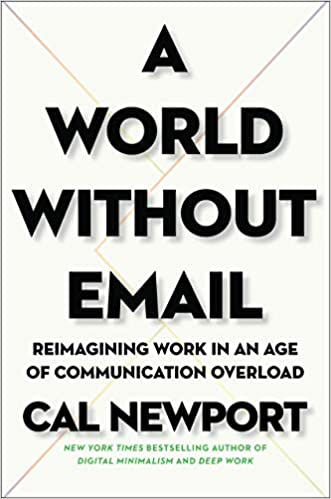You have /5 articles left.
Sign up for a free account or log in.
 A World Without Email: Reimagining Work in an Age of Communication Overload by Cal Newport
A World Without Email: Reimagining Work in an Age of Communication Overload by Cal Newport
Published in March 2021
When I told colleagues that I was reading Cal Newport’s new book, A World Without Email, the responses were pretty much universal:
- “Captain Obvious.”
- “Now that’s original.” (Said sarcastically.)
- “Not another anti-email fantasy.”
We all know the email overload is killing our productivity, draining our attention and destroying our ability to focus. Do we really need a whole book to tell us what we all already know?
It turns out that we do.
A World Without Email is surprisingly awesome.
Well, I do have some pushbacks and complaints for its author -- Georgetown CS professor Cal Newport -- which I’ll get to below. But first, let me try to convince you to read the book.
Despite the book’s title, A World Without Email is not really about email. What Newport is taking on is the broader issue of how knowledge work gets done (or not done) today.
Newport describes how most organizations structure people’s work as unstructured. Information workers (which includes most everyone in higher ed) have been mostly left alone to figure out their work strategies. However, the worthy goal of allowing employees autonomy has devolved into a set of workplace norms and behaviors that are making everyone miserable.
The main culprit of our distress as workers is not email. Email is just a tool. Instead, the root of the problem is the emergence of what Newport calls the hyperactive hive mind.
The digital tools that we use to connect us, be they email or Slack, end up cannibalizing focus and energy for deep creative work.
Newport dives deeply into why the culture of most organizations has evolved to where norms of communications and response are more or less synchronous. Nobody planned for digital communications to constantly distract us from focusing on our work. Instead, our behaviors are being determined by the technologies we use -- rather than the other way around.
Reading A World Without Email has inspired some changes in how I work. As a professor, Newport’s suggestions for escaping the hyperactive hive mind are highly relevant for academia. As many of his examples for avoiding distraction creating space for creative flow come from Newport’s teaching, research and service responsibilities -- higher ed readers can adopt many of his suggestions whole cloth.
On my part, I’ve taken to turning off my email and shutting down Slack when I am trying to write. Scheduling blocks on your calendar for focused work -- time when meetings can’t be booked -- is also effective.
Newport was writing pre-COVID, so he does not include Zoom as a contributor to the hyperactive hive mind. I’ve tried to extend his arguments to synchronous meeting platforms.
Complaints about A World Without Email?
While Newport inoculates himself some by owning up to his privilege in being able to deviate from established communications norms, he mostly fails to address the role of status and power in his analysis.
Most of us who work in higher ed, and likely in every other industry, do not have the luxury of blocking off extended periods away from digital communications. The expectation is that we will be responsive to incoming messages.
While most people in most organizations have some autonomy and agency in how they work, that work still gets done within a culture and a structure that they did not create.
If the hyperactive hive mind is hurting productivity, then the people with the most power in organizations are responsible for shifting both the culture and the structure.
Newport’s suggestions for reclaiming our workplace sanity may be highly applicable for professors and other privileged employees, but they are significantly less relevant for everyone else. The arguments in his book would have been stronger if Newport had spent more time thinking about the impact of hierarchies, status and power in his analysis of the effects of digital communications on personal and organizational productivity.
Despite these critiques, or maybe because of them, I maintain that our university leaders (those with the most power) should read A World Without Email. Presidents, provosts, VPs and deans may think that it is not their jobs to think about how faculty and staff communicate. A World Without Email may inspire all these folks to re-evaluate that assumption.
What are you reading?




